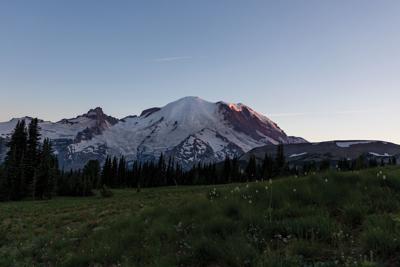On Nov. 14, the Biden Administration released the Fifth National Climate Assessment (NCA) detailing how climate change is affecting the United States and how institutions and communities are responding. The report, mandated every four years, is written by researchers and federal agencies to condense the most recent climate data and break the effects down by 10 regions.
According to the assessment, severe climate risks in the U.S. are expected to persist and grow without accelerated adaptation efforts and decreases in global greenhouse gas emissions. To stay below a 2 degrees Celsius (3.6 degrees Fahrenheit) temperature increase, global carbon dioxide emissions must reach net zero by around 2050, meaning U.S. carbon dioxide emissions must decrease by 6% annually on average. Between 2005 and 2019, U.S. carbon emissions have only decreased around 1% on average annually.
“[Global] warming is the [effect] that we can expect the most,” Crystal Raymond, UW climate adaptation specialist and author on the report, said. “We don’t know exactly how much warming, but certainly warming, and then [the risks] that are connected to warming.”
Raymond explained that one such risk is the reduction in snow pack, which is fallen snow that does not melt for an extended period of time. This reduction then affects water supply and hydropower generation.
The Northwest region, defined in the report as Washington, Oregon, and Idaho, can also expect increasing summer temperatures, rising sea levels, and less precipitation in the summer without climate mitigation and adaptation. Additionally, climate change is causing wildfires in the region to become larger and more intense, a trend that is projected to continue.
The fifth NCA also addressed how climate change is worsening human health and amplifying health inequities.
“The risk [of these effects] will continue to grow with additional greenhouse gas emissions and without additional investments and adaptations,” Kristie Ebi, UW global health professor and one of the lead authors on the human health chapter, said. “The health benefits of mitigation are the same order of magnitude, if not larger, than the cost of mitigation.”
The assessment explained the extent to which every region of the U.S. has already taken climate action. For example, King County began developing an Extreme Heat Mitigation Strategy in 2022 after the 2021 heat wave that caused 100 heat-related deaths.
“I think a lot of [climate] adaptation is kind of within the realm of the government, but I do think there are some things people can consider in terms of adaptation,” Raymond said.
Ebi and Raymond both noted how individuals can take climate action by increasing their awareness and preparedness for climate events, such as floods and wildfires.
“I always encourage people to be just more aware of the conditions that are happening and options you might want to consider for protecting yourself from heat events or poor air quality events,” Raymond said. “I think it’s similar [to] preparation steps we consider for earthquakes.”
Despite details about the climate actions taken by communities and regions across the U.S., the report stresses that the current actions are not enough to offset the risk projections.
“If people are going to dismiss this as a doom and gloom report, they should take a closer look because I think it is about trying to show and highlight the solutions that are happening,” Raymond said. “Recognizing that [climate action] needs to happen at every multiple levels … and we need to ramp it up given the extensive impacts that we expect.”
Reach environmental beat writer McKenna Sweet at news@dailyuw.com. X: @mckenna_319 Like what you’re reading? Support high-quality student journalism by donating here.




(0) comments
Welcome to the discussion.
Log In
Keep it Clean. Please avoid obscene, vulgar, lewd, racist or sexually-oriented language.
PLEASE TURN OFF YOUR CAPS LOCK.
Don't Threaten. Threats of harming another person will not be tolerated.
Be Truthful. Don't knowingly lie about anyone or anything.
Be Nice. No racism, sexism or any sort of -ism that is degrading to another person.
Be Proactive. Use the 'Report' link on each comment to let us know of abusive posts.
Share with Us. We'd love to hear eyewitness accounts, the history behind an article.